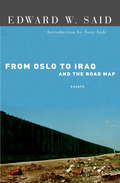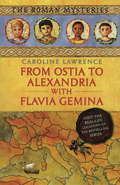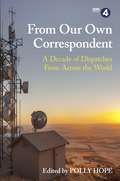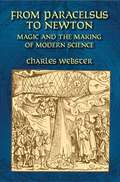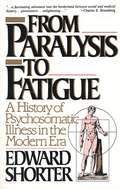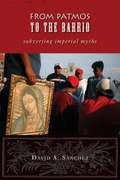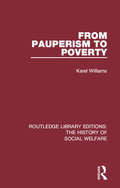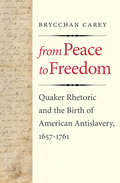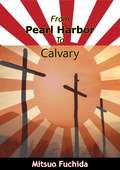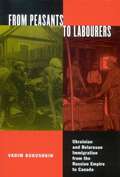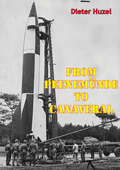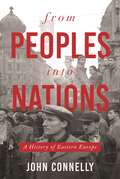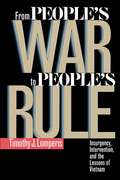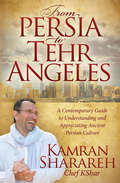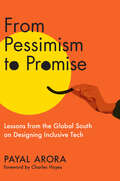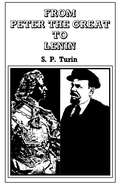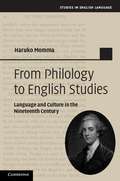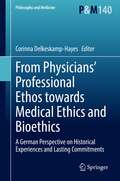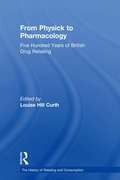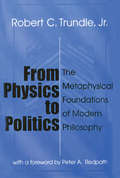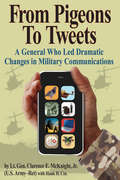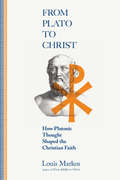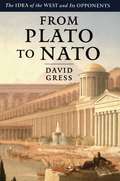- Table View
- List View
From Oslo to Iraq and the Road Map
by Edward W. SaidIn his final book, completed just before his death, Edward W. Said offers impassioned pleas for the beleaguered Palestinian cause from one of its most eloquent spokesmen. These essays, which originally appeared in Cairo's Al-Ahram Weekly, London's Al-Hayat, and the London Review of Books, take us from the Oslo Accords through the U. S. led invasion of Iraq, and present information and perspectives too rarely visible in America. Said is unyielding in his call for truth and justice. He insists on truth about Israel's role as occupier and its treatment of the Palestinians. He pleads for new avenues of communication between progressive elements in Israel and Palestine. And he is equally forceful in his condemnation of Arab failures and the need for real leadership in the Arab world.
From Ostia to Alexandria with Flavia Gemina: Travels with Flavia Gemina (The Roman Mysteries #1)
by Caroline LawrenceFrom Morocco to Libya, from Ostia to Surrentum - Caroline Lawrence has travelled widely to give the Roman Mysteries unrivalled authenticity among historical novels. Her research trips have yielded a dazzling array of insights that allow Caroline to vividly re-imagine the ancient world and to bring her characters and stories to life. This book gathers together anecdotes, factual information and advice for children and their families looking to explore exotic locations, as well as offering compelling background to the real world behind the bestselling Roman Mysteries novels.
From Our Own Correspondent: Dispatches of a Decade from Across the World
by Polly Hope<p>For more than sixty-five years on the air, From Our Own Correspondent has been one of BBC Radio's flagship programmes. It has taken listeners to parts of the world where they have never gone, and perhaps never would: war zones, refugee camps, elite universities, space stations, spy academies and lions' dens of all sorts. Its dispatches introduce audiences to people they might never expect to meet - kingpins, revolutionaries, assassins and outcasts. It has always relied on the power of personal testimony, with its contributors not merely reporting the news, but sharing what they found out along the way, and how it felt. Its correspondents often relate the unexpected: the day they visited the town that is crazy about trout fishing, attended a forty-course Chinese banquet, experienced zero gravity on a flight with Russian cosmonauts, went mud wrestling in Turkey or ballroom dancing in Cameroon.<p> <p>Themed by continent and region, From Our Own Correspondent brings together the most compelling stories of the past ten years. It is a perfect primer for the understanding of the modern world.<p>
From Paracelsus to Newton: Magic and the Making of Modern Science
by Charles WebsterThe alchemist and physician known as Paracelsus (1493-1541) appears to have dwelt in a completely different intellectual world from Sir Isaac Newton (1642-1727). Newton's work lies in the lofty era of the Enlightenment and the modern world, while that of the enigmatic Paracelsus conjures up the superstitious lore of the Dark Ages. The rise of science and the decline of magic unfolded over many generations, and as this fascinating book shows, there existed remarkable elements of continuity between the world views of the early sixteenth and late seventeenth centuries.The essays contained in this volume constitute a slightly modified version of the Eddington Lectures, delivered at Cambridge in the autumn of 1980. In this masterly series of discourses, Charles Webster explores three test cases relating to prophecy, spiritual magic, and demonic magic. Focusing on evidence from Germany at the time of the Reformation and from England during the Restoration, these essays form a more balanced historical perspective on the epistemological shift that occurred between the ages of Paracelsus and Newton. They propose a view of the Scientific Revolution as a diverse phenomenon, the result of a dynamic interplay of forces emanating from many different directions, and all contributing to the process of creativity and change. 20 black-and-white illustrations. Introduction. Notes to each chapter.
From Paralysis to Fatigue: A History of Psychosomatic Illness in the Modern Era
by Edward ShorterThe first book to put the physical symptoms of stress in their historical and cultural context, Shorter's fascinating history shows how patients throughout the centuries have experienced symptoms of stress in tandem with the cultural shifts of larger society.
From Patmos To The Barrio: Subverting Imperial Myths
by David A. SanchezSanchez's subject is the power of imperial myths - and the subversive power unleashed when resistance movements take over those myths for their own purposes. Moving from John of Patmos's inversion of Roman imperial mythology in Revelation 12 to the indigenous appropriation of Spanish symbolism and mythology, drawn from Revelation 12, in 17th-century Mexico, Sanchez then explores the continuing power of the Virgin of Guadalupe to inspire movements for a better society in our own day.
From Pauperism to Poverty (Routledge Library Editions: The History of Social Welfare #24)
by Karel WilliamsFirst published in 1981, From Pauperism to Poverty consists of seven essays, three of which focus on the English poor law between 1800 and 1914 and four of which examine texts of social investigation by Mayhew, Engels, Booth and Rowntree. Rather than making a specialist contribution to the history of social thought and policy, the essays raise general questions about current ways of writing history and alternative analyses of specific texts or institutions are developed. In doing so, the previous histories of the relief of pauperism and the discovery of poverty are revised at many points. Most notably, it is demonstrated for the first time that relief to unemployed men was virtually abolished after 1850. This book will be of interest to those studying the history of social welfare and poverty.
From Peace to Freedom
by Brycchan CareyIn the first book to investigate in detail the origins of antislavery thought and rhetoric within the Society of Friends, Brycchan Carey shows how the Quakers turned against slavery in the first half of the eighteenth century and became the first organization to take a stand against the slave trade. Through meticulous examination of the earliest writings of the Friends, including journals and letters, Carey reveals the society’s gradual transition from expressing doubt about slavery to adamant opposition. He shows that while progression toward this stance was ongoing, it was slow and uneven and that it was vigorous internal debate and discussion that ultimately led to a call for abolition. His book will be a major contribution to the history of the rhetoric of antislavery and the development of antislavery thought as explicated in early Quaker writing.
From Pearl Harbor To Calvary
by Mitsuo FuchidaThe true story of the lead pilot of the Pearl Harbor attack and his conversion to Christianity."As I looked across at my companion, I marveled afresh at the goodness of God-this man was my enemy; now he is my brother! Such is the miracle of the grace of God."--Rev. Elmer Sachs, Director of Sky Pilots International.These words were written of Mitsuo Fuchida, who led the first wave of the air attacks on Pearl Harbor on December 7, 1941 as a Captain in the Imperial Japanese Navy Air Service. After the war, Fuchida was introduced to the gospel through the testimony of Jacob DeShazer. He began reading the Bible and eleven years after Pearl Harbor, he became a Christian.Fuchida spoke boldly of his conversion in his native Japan, and a few years later, he was recruited by Rev. Elmer Sachs to join Sky Pilots International. He came to the United States where he had the opportunity to share his story across the country. From Pearl Harbor to Calvary is the story of Mitsuo Fuchida's conversion and ministry in his own words. Central to his narrative is the message that God works through even the most improbable of circumstances to further the gospel.
From Peasants to Labourers: Ukrainian and Belarusan Immigration from the Russian Empire to Canada (McGill-Queen's Studies in Ethnic History #23)
by Vadim KukushkinWritten from the migration systems perspective, From Peasants to Labourers places the migration of Ukrainian and Belarusan peasant-workers within the context of Old- and New-World economic structures and state policies. Through painstaking analysis of thousands of personal migrant files in the archives of the Russian consulates in Canada, Kukushkin fills a void in our knowledge of the geographic origins, spatial trajectories, and ethnic composition of early twentieth-century Canadian immigration from Eastern Europe. From Peasants to Labourers also provides important insights into the nature of ethnic identity formation through an exploration of the meaning of "Russianness" in early twentieth-century Canada.
From Peenemünde To Canaveral
by Dieter HuzelDieter Huzel was an electronic engineer with his whole career ahead of him when Germany lurched into the Second World War, he was conscripted and destined for the Russian Front when fate intervened. He and many other scientists were re-assigned from combat duty to the top secret installation at Peenemünde Island off the Baltic coast as part of the Nazi search for "Wonder Weapons". Huzel describes how he became an integral part of the V weapon program which, despite the frequent Allied bombings, produced the feared V-1 and V-2 rockets that rained down on liberated parts of Europe during the later years of the war.As the tide turned against the Nazi regime, Huzel tells of the shifts in production of these weapons to central Germany and his team's rising fear that the rocket technology would fall into the hands of the Russians. However, Huzel and his team were captured by the West and offered re-location to Britain or America. Huzel and his former director, Werner Von Braun, opted for America where they would become part of the ground-breaking Rocketdyne research team and spearhead of the NASA push for space exploration.
From Peoples into Nations: A History of Eastern Europe
by John ConnellyA sweeping narrative history of Eastern Europe from the late eighteenth century to todayIn the 1780s, the Habsburg monarch Joseph II decreed that henceforth German would be the language of his realm. His intention was to forge a unified state from his vast and disparate possessions, but his action had the opposite effect, catalyzing the emergence of competing nationalisms among his Hungarian, Czech, and other subjects, who feared that their languages and cultures would be lost. In this sweeping narrative history of Eastern Europe since the late eighteenth century, John Connelly connects the stories of the region's diverse peoples, telling how, at a profound level, they have a shared understanding of the past.An ancient history of invasion and migration made the region into a cultural landscape of extraordinary variety, a patchwork in which Slovaks, Bosnians, and countless others live shoulder to shoulder and where calls for national autonomy often have had bloody effects among the interwoven ethnicities. Connelly traces the rise of nationalism in Polish, Austro-Hungarian, and Ottoman lands; the creation of new states after the First World War and their later absorption by the Nazi Reich and the Soviet Bloc; the reemergence of democracy and separatist movements after the collapse of communism; and the recent surge of populist politics throughout the region.Because of this common experience of upheaval, East Europeans are people with an acute feeling for the precariousness of history: they know that nations are not eternal, but come and go; sometimes they disappear. From Peoples into Nations tells their story.
From People’s War to People’s Rule
by Timothy J. LomperisTimothy Lomperis persuasively argues the ironic point that the lessons of American involvement in Vietnam are not to be found in any analysis of the war by itself. Rather, he proposes a comparison of the Vietnam experience with seven other cases of Western intervention in communist insurgencies during the Cold War era: China, Indochina, Greece, the Philippines, Malaya, Cambodia, and Laos. Lomperis maintains that popular insurgencies are manifestations of crises in political legitimacy, which occur as a result of the societal stresses caused by modernization. Therefore, he argues, any intervention in a 'people's war' will succeed or fail depending on how it affects this crisis. The unifying theme in the cases Lomperis discusses is the power of land reform and electoral democracy to cement political legitimacy and therefore deflect revolutionary movements. Applying this theory to the ongoing Sendero Luminoso insurgency in Peru, Lomperis makes a qualified prediction of that conflict's outcome. He concludes that a global trend toward democratization has produced a new era of 'people's rule.'
From Persia to Tehr Angeles: A Contemporary Guide to Understanding and Appreciating Ancient Persian Culture
by Kamran Sharareh Chef KSharAn Iranian-American explains the history and heritage of his people, in both the old world and the new. From Persia to Tehr Angeles is a fascinating look at everything from Persia&’s ancient past to the modern world of Persian-American immigrants in places like Los Angeles—offering a rich, rounded view a culture many are unfamiliar with. For those who are part of this history, their friends and families, or anyone interested in this corner of the world, it&’s an enlightening look at traditions, food, religion, and other aspects of this complex society over many generations.
From Pessimism to Promise: Lessons from the Global South on Designing Inclusive Tech
by Payal AroraA radical paradigm shift in the way we think about AI and tech, taking hope and inspiration from the aspirational users of new technologies around the world.When it comes to tech, the mainstream headlines are bleak: Algorithms control and oppress. AI will destroy democracy and our social fabric, and possibly even drive us to extinction. While legitimate concerns drive these fears, we need to equally account for the fact that tech affords young people something incredibly valuable—a rare space for self-actualization. In From Pessimism to Promise, award-winning author Payal Arora explains that, outside the West, where most of the world’s youth reside, there is a significant different outlook on tech: in fact, there is a contagion of optimism toward all things digital. These users, especially those in marginalized contexts, are full of hope for new tech.As AI disrupts sectors across industries, education, and beyond, who better to shine the light forward, Arora argues, than the Global South, the navigator of all manner of forced disruptions, leapfrogging obstructive systems, norms, and practices to rapidly reinvent itself? Drawing on field insights in diverse global contexts such as Brazil, India, and Bangladesh, Payal describes what drives Gen Z to embrace new technologies. From Pessimism to Promise discusses the shift to relationally-driven approaches to design; how to create “algorithms of aspiration”; how to reimagine the digital space for sex, pleasure, and care; and, what we can learn from feminist digital activists and women’s collectives in the Global South on shared digital provenance and value, as well as indigenous approaches to sustainability, that challenges sacred ideas on degrowth, circular economy, and the doughnut economy. Arora also takes heart in the power in numbers, as the users from the majority world infuse algorithms with everyday aspirations, pushing for a new digital order.Timely and urgent, From Pessimism to Promise makes a deeply compelling case that it is not naïve to be optimistic about our digital future. On the contrary, it is our moral imperative to design with hope.
From Peter the Great to Lenin Cb: History of Russian Labour Movement With Special Reference to Trade Unionism
by S.P. TurinFirst published in 1968, the main purpose of this study is to present an account of the Russian Labour Movement, based mainly on original Russian sources. The Labour Movement differed greatly from those of the chief European countries from its inception to the final stage. This text investigates the main trends of the m; to analyse the origins and nature of soviets; and to describe the scope and character of the Russian Labour organization.
From Philology to English Studies
by Haruko MommaThe study of English language and literature in Britain changed dramatically between the end of the eighteenth century and the beginning of the twentieth. From Philology to English Studies explores the contribution of philology to this movement. Haruko Momma charts both the rise and fall of philology from antiquity to the late eighteenth century, and the impact of modern philology on the study of modern languages and literatures. Focusing in detail on the work of key philologists in the nineteenth century, Momma considers how they shaped European discourse and especially vernacular studies in Britain: William Jones's discovery of Sanskrit in British India gave rise to Indo-European studies; Max Müller's study of this same language helped spread the Aryan myth to the English-speaking world; the OED achieved its greatness as a post-national lexicon under the editorship of James Murray, a dialectologist originally from Scotland.
From Physicians’ Professional Ethos towards Medical Ethics and Bioethics: A German Perspective on Historical Experiences and Lasting Commitments (Philosophy and Medicine #140)
by Corinna Delkeskamp-HayesThis book assembles essays by thinkers who were at the center of the German post World War II development of ethical thought in medicine. It records their strategies for overcoming initial resistance among physicians and philosophers and (in the East) politicians. This work traces their different approaches, such as socialist versus liberal bioethics; illustrates their attempt to introduce a culture of dialogue in medicine; and examines their moral ambiguities inherent to the institutionalization of bioethics and in law. Furthermore, the essays in this work pay special attention to the problem of ethics expertise in the context of a pluralism, which the intellectual mainstream of the country seeks to reduce to “varieties of post-traditionalism". Finally, this book addresses the problem of “patient autonomy”,and highlights the difficulty of harmonizing commitment to professional integrity with the project of enhancing physician’s responsiveness to suffering patients. As these essays illustrate, the development of bioethics in Germany does not follow a linear line of progressiveness, but rather retains a sense of the traditional ethos of the guild. An ethos, however, that is challenged by moral pluralism in such a way that, even today, still requires adequate solutions. A must read for all academics interested in the origins and the development of bioethics.
From Physick to Pharmacology: Five Hundred Years of British Drug Retailing (The History of Retailing and Consumption)
by Louise Hill CurthFrom Physick to Pharmacology addresses the important, albeit neglected history of the distribution and sale of medicinal drugs in England from the sixteenth to the twenty-first century. The social history of early medicine and the evolution of British retailing are two areas that have attracted considerable attention from academics in recent years. That said, little work has been done either by medical or business historians on the actual retailing of drugs. This book merges the two themes by examining the growth in the retailing of medicinal drugs since late-medieval times. The six academics contributing essays include both medical and business historians who provide an informed and stimulating perspective on the subject. After an introduction setting out the context of drug retailing and surveying the current literature, the volume is arranged in a broadly chronological order, beginning with Patrick Wallis's study of apothecaries and other medical retailers in early modern London. The next chapter, by Louise Hill Curth, looks at the way the distribution network expanded to encompass a range of other retail outlets to sell new, branded, pre-packaged proprietary drugs. Steven King then examines various other ways in which medicines were sold in the eighteenth century, with a focus on itinerant traders. This is followed by pieces from Hilary Marland on the rise of chemists and druggists in the nineteenth century, and Stuart Anderson on twentieth-century community pharmacists. The final essay, by Judy Slinn, examines the marketing and consumption of prescription drugs from the middle of that century until the present day. Taken together, these essays provide a fascinating insight into the changes and continuities of five centuries of drug retailing in England.
From Physics to Politics: The Metaphysical Foundations of Modern Philosophy
by Robert TrundleMass ideology is unique to modern society and rooted in early modern philosophy. Traditionally, knowledge had been viewed as resting on metaphysics. Rejecting metaphysical truth evoked questions about the source of -truth.- For nineteenth-century ideologists, -truth- comes either from dominating classes in a progressively determined history or from a post-Copernican freedom of the superior man to create it. In From Physics to Politics Robert C. Trundle, Jr. uncovers the relation of modern philosophy to political ideology. And in rooting truth in human nature and Nature by modal reasoning, he resolves the problem of politicized truth. Our concepts of scientific truth, logic, and necessity are essentially connected. Modern philosophy restricts our understanding of necessity to the political dreams and aspirations of Enlightenment intellectuals. As a result, these intellectuals refuse to acknowledge as factual or meaningful whatever is not intelligible within the practical goals of establishing science as a system of enlightened ideas. The effect of these ideas is that in our time metaphysical principles, speculative truths, our understanding of science, and the nature of logic have become subordinated to ideological dreams. Fascism, Nazism, Marxism, political correctness, and moral relativism are not historical aberrations but essential consequences. Trundle's work is groundbreaking and daring, and his underlying thesis demonstrates why scientific truth demands a modal defense. The defense not only integrates science, ethics, and politics, but shows how -truth- may be ascribed to moral and scientific principles in contrast to a modern philosophical tradition. Since this tradition is the origin of political ideology, it has led to an irrational politicization of truth. The book will appeal particularly to those interested in political history, histories of philosophy, the philosophy of sciences, and ethics.
From Pigeons To Tweets: A General Who Led Dramatic Changes in Military Communications
by Hank Cox Jr. Clarence E. Mcknight Jr.General Clarence E. McKnight led the US Army into the modern age of computer warfare developing portals through which new channels of digitalizations flowed to a welcoming civilian usage. A graduate of West Point Academy, McKnight rose to the rank of Commanding General of the US Army's Signal Corps developing technology used by all the military services. McKnight was made a distinguished graduate of West Point, an uncommon honor and is being inducted into the US Army War College Museum for distinguished alumnus. This book is about military communications and how they developed strategies over the years to what we now use in the most advanced technology, science and engineering.
From Pigeons To Tweets: A General Who Led Dramatic Changes in Military Communications
by Hank Cox Jr. Clarence E. Mcknight Jr.General Clarence E. McKnight led the US Army into the modern age of computer warfare developing portals through which new channels of digitalizations flowed to a welcoming civilian usage. A graduate of West Point Academy, McKnight rose to the rank of Commanding General of the US Army's Signal Corps developing technology used by all the military services. McKnight was made a distinguished graduate of West Point, an uncommon honor and is being inducted into the US Army War College Museum for distinguished alumnus. This book is about military communications and how they developed strategies over the years to what we now use in the most advanced technology, science and engineering.
From Plato to Christ: How Platonic Thought Shaped the Christian Faith
by Louis MarkosWhat does Plato have to do with the Christian faith? Quite a bit, it turns out. In ways that might surprise us, Christians throughout the history of the church and even today have inherited aspects of the ancient Greek philosophy of Plato, who was both Socrates's student and Aristotle's teacher. To help us understand the influence of Platonic thought on the Christian faith, Louis Markos offers careful readings of some of Plato's best-known texts and then traces the ways that his work shaped the faith of some of Christianity's most beloved theologians, including Gregory of Nyssa, Augustine, Dante, and C. S. Lewis. With Markos's guidance, readers can ascend to a true understanding of Plato's influence on the faith.
From Plato to Lumière
by Timothy Barnard Andre GaudreaultWith this lucid translation of Du litteraire au filmique, André Gaudreault's highly influential and original study of film narratology is now accessible to English-language audiences for the first time. Building a theory of narrative on sources as diverse as Plato, The Arabian Nights,and Proust, From Plato to Lumière challenges narratological orthodoxy by positing that all forms of narrative are mediated by an "underlying narrator" who exists between the author and narrative text. Offering illuminating insights, definitions, and formal distinctions, Gaudreault examines the practices of novelists, playwrights, and filmmakers and applies his theory to the early cinema of the Lumière brothers and more recent films. He also enhances our understanding of how narrative develops visually without language - monstration - by detailing how the evolution of the medium influenced narratives in cinema. From Plato to Lumière includes a translation of Paul Ricoeur's preface to the French-language edition as well as a new preface by Tom Gunning. It is a must-read for cinema and media students and scholars and an essential text on the study of narrative.
From Plato to NATO
by David GressAn in-depth intellectual history of the Western idea and a passionate defense of its importance to America's future, From Plato to NATO is the first book to make sense of the legacy of the West at a time when it is facing its greatest challenges. Readers of Francis Fukuyama, John Gray, Samuel Huntington, and other analysts of the dilemmas of Western nations in the twenty-first century will find in David Gress's original account a fuller description of what the West really is and how, with the best of intentions, it has been misrepresented. Most important, they will encounter a new vision of Western identity and how it can be recovered. Early in the twentieth century, American educators put together a story of Western civilization, its origins, history, and promise that for the subsequent fifty years remained at the heart of American college education. The story they told was of a Western civilization that began with the Greeks and continued through 2,500 years of great books and great ideas, culminating in twentieth-century progressive liberal democracy, science, and capitalist prosperity. In the 1960s, this Grand Narrative of the West came under attack. Over the next thirty years, the critics turned this old story into its opposite: a series of anti-narratives about the evils, the failures, and the betrayals of justice that, so they said, constituted Western history. The victory of Western values at the end of the cold war, the spread of democracy and capitalism, and the worldwide impact of American popular culture have not revived the Grand Narrative in the European and American heartlands of the West. David Gress explains this paradox, arguing that the Grand Narrative of the West was flawed from the beginning: that the West did not begin in Greece and that, in morality and religion, the Greeks were an alien civilization whose contribution was mediated through Rome and Christianity. Furthermore, in assuming a continuity from the Greeks to modern liberalism, we have mistakenly downplayed or rejected everything in between, focusing on the great ideas and the great books rather than on real history with all its ambiguities, conflicts, and contradictions. The heart of Gress's case for the future of the West is that the New must remember its roots in the Old and seek a synthesis. For as the attacks have demonstrated, the New West cannot stand alone. Its very virtues -- liberty, reason, progress -- grew out of the Old West and cannot flourish when removed from that rich soil.
